| Listing 1 - 10 of 38 | << page >> |
Sort by
|
Book
ISBN: 9780415888288 9780203815809 041588828X 0203815807 1280665610 9786613642547 113671765X 9781136717604 9781136717642 9781136717659 9780415854122 0415854121 1136717641 Year: 2011 Publisher: New York, N.Y. Routledge
Abstract | Keywords | Export | Availability | Bookmark
 Loading...
Loading...Choose an application
- Reference Manager
- EndNote
- RefWorks (Direct export to RefWorks)
In this innovative collection, an international group of scholars come together to discuss literary metaphors and cognitive metaphor theory. The volume's goals are three-fold. The first aim of the book is to present some recent approaches to metaphor which have no immediate connection with cognitive metaphor theory and have developed independently of it. While the cognitive approach has become the leading paradigm in the English speaking world, elsewhere (in Europe) rhetorical, semantic, and logical models have remained in use and continue to be elaborated. These models have so far had little international exposure. Their inclusion in this study is meant to provide a balance to the cognitive paradigm and to open up a possible discussion of the advantages and disadvantages of cognitive metaphor theory for the analysis of literary texts. The second aim of the collection is to illustrate a range of successful applications of the new cognitive models to literary texts. And, the third aim of the study is to provide an assessment of cognitive metaphor theory from a literary point of view.
Lexicology. Semantics --- Psycholinguistics --- Literary rhetorics --- Stilistics --- Pragmatics --- Cognition in literature. --- Discourse analysis, Literary. --- Figures of speech in literature --- Metaphor in literature. --- Metaphor. --- 82.085.41 --- Literaire metafoor. Beeldspraak --- 82.085.41 Literaire metafoor. Beeldspraak --- Figures of speech in literature. --- Cognition in literature --- Discourse analysis, Literary --- Metaphor --- Metaphor in literature --- Parabole --- Figures of speech --- Reification --- Literary discourse analysis --- Rhetoric --- Literary style --- Métaphore --- Cognition --- Analyse du discours. --- Dans la littérature.
Book
ISBN: 9780415450294 0415450292 9780415450300 9780203882887 0203882881 0415450306 9781134058723 9781134058761 9781134058778 Year: 2009 Publisher: London Routledge, Taylor & Francis Group
Abstract | Keywords | Export | Availability | Bookmark
 Loading...
Loading...Choose an application
- Reference Manager
- EndNote
- RefWorks (Direct export to RefWorks)
An Introduction to Narratology is an accessible, practical guide to narratological theory and terminology and its application to literature. In this book, Monika Fludernik outlines: * the key concepts of style, metaphor and metonymy, and the history of narrative forms * narratological approaches to interpretation and the linguistic aspects of texts, including new cognitive developments in the field * how students can use narratological theory to work with texts, incorporating detailed practical examples * a glossary of useful narrative terms, and suggestions for further reading. This textbook offers a comprehensive overview of the key aspects of narratology by a leading practitioner in the field. It demystifies the subject in a way that is accessible to beginners, but also reflects recent theoretical developments and narratology's increasing popularity as a critical tool.
Fiction --- Literary rhetorics --- Narration (Rhetoric). --- Narration --- Narration (Rhetoric) --- 82-3 --- Proza. Fictie. Narratologie --- 82-3 Proza. Fictie. Narratologie --- Narrative (Rhetoric) --- Narrative writing --- Rhetoric --- Discourse analysis, Narrative --- Narratees (Rhetoric) --- Verhalend proza --- Literaire retoriek --- 82-3 Fiction. Prose narrative --- Fiction. Prose narrative
Book
ISBN: 9783534163304 3534163303 Year: 2006 Publisher: Darmstadt Wissenschaftliche Buchgesellschaft
Abstract | Keywords | Export | Availability | Bookmark
 Loading...
Loading...Choose an application
- Reference Manager
- EndNote
- RefWorks (Direct export to RefWorks)
Diese Einführung wendet sich vor allem an Studienanfänger und Studenten der unteren Semester im Fach Literaturwissenschaft, die einen verständlichen Einstieg in die Erzähltheorie suchen. Der Band vermittelt Grundkenntnisse der Narratologie, stellt wichtige erzähltheoretische Konzepte und Theorien vor und illustriert diese an zahlreichen Beispielen aus der deutschen, englischen und französischen Literatur.
Fiction --- Literary rhetorics --- Analyse du discours narratif
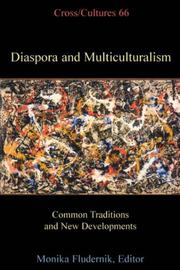
ISBN: 9042009063 9789042009066 9042009160 9004486534 Year: 2003 Publisher: Amsterdam Rodopi
Abstract | Keywords | Export | Availability | Bookmark
 Loading...
Loading...Choose an application
- Reference Manager
- EndNote
- RefWorks (Direct export to RefWorks)
82:3 --- 82:93 --- 82.04 --- Literatuur en maatschappijwetenschappen --- Literatuur en geschiedenis --- Literaire thema's --- 82.04 Literaire thema's --- 82:93 Literatuur en geschiedenis --- 82:3 Literatuur en maatschappijwetenschappen
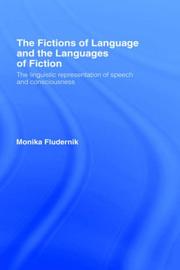
ISBN: 0415092264 9780415092265 Year: 1993 Publisher: London: Routledge,
Abstract | Keywords | Export | Availability | Bookmark
 Loading...
Loading...Choose an application
- Reference Manager
- EndNote
- RefWorks (Direct export to RefWorks)
Psychology in literature --- Free indirect speech --- Fiction --- Discourse analysis, Narrative --- Discourse analysis, Literary --- Technique --- --Littérature /et Psychologie --- --Roman --- Free indirect style --- Indirect speech, Free --- Speech, Free indirect --- Indirect discourse in literature --- Literary discourse analysis --- Free indirect speech. --- 801.56 --- 82-3 --- -Psychology in literature --- Psychology as a theme in literature --- Narrative discourse analysis --- Metafiction --- Novellas (Short novels) --- Novels --- Stories --- 82-3 Proza. Fictie. Narratologie --- Proza. Fictie. Narratologie --- 801.56 Syntaxis. Semantiek --- Syntaxis. Semantiek --- Philosophy --- Narration (Rhetoric) --- Rhetoric --- Literary style --- Fiction writing --- Writing, Fiction --- Authorship --- Psychological study of literature --- Pragmatics --- Discourse analysis, Literary. --- Discours --- --Analyse --- Narration --- --Théories --- 1149 --- 1552 --- Discourse analysis, Narrative. --- Psychology in literature. --- Technique. --- --Narration --- Psychologie --- --Littérature --- --Technique --- Fiction - Technique --- Analyse --- Roman --- Littérature --- ANALYSE DU DISCOURS NARRATIF --- ANALYSE DU DISCOURS LITTERAIRE --- DISCOURS INDIRECT LIBRE --- ROMAN --- PSYCHOLOGIE DANS LA LITTERATURE --- TECHNIQUE
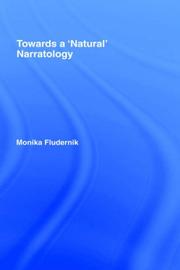
ISBN: 0415124824 9780415585637 9780203432501 9781134802548 9781134802586 9781134802593 9780415124829 Year: 1996 Publisher: London: Routledge,
Abstract | Keywords | Export | Availability | Bookmark
 Loading...
Loading...Choose an application
- Reference Manager
- EndNote
- RefWorks (Direct export to RefWorks)
#KVHA:Literaire theorie --- #KVHA:Narratologie --- 82-3 --- Criticism --- Narration (Rhetoric) --- Narrative (Rhetoric) --- Narrative writing --- Evaluation of literature --- Literary criticism --- Literature --- 82-3 Proza. Fictie. Narratologie --- Proza. Fictie. Narratologie --- Technique --- Evaluation --- Criticism. --- Narration (Rhetoric). --- Rhetoric --- Discourse analysis, Narrative --- Narratees (Rhetoric) --- Aesthetics --- Literary rhetorics --- 82-3 Fiction. Prose narrative --- Fiction. Prose narrative --- Discours (linguistique) --- Discourse analysis. --- Rhétorique. --- Rhetoric. --- Critique littéraire. --- Analyse du discours narratif. --- Narration. --- Rhétorique. --- Critique littéraire.
Book
ISBN: 9780198840909 Year: 2019 Publisher: Oxford New York, NY Oxford University Press
Abstract | Keywords | Export | Availability | Bookmark
 Loading...
Loading...Choose an application
- Reference Manager
- EndNote
- RefWorks (Direct export to RefWorks)
Metaphors of Confinement: The Prison in Fact, Fiction, and Fantasy offers a historical survey of imaginings of the prison as expressed in carceral metaphors in a range of texts about imprisonment from Antiquity to the present as well as non-penal situations described as confining or restrictive. These imaginings coalesce into a 'carceral imaginary' that determines the way we think about prisons, just as social debates about punishment and criminals feed into the way carceral imaginary develops over time. 0Examining not only English-language prose fiction but also poetry and drama from the Middle Ages to postcolonial, particularly African, literature, the book juxtaposes literary and non-literary contexts and contrasts fictional and nonfictional representations of (im)prison(ment) and discussions about the prison as institution and experiential reality. It comments on present-day trends of punitivity and foregrounds the ethical dimensions of penal punishment. The main argument concerns the continuity of carceral metaphors through the centuries despite historical developments that included major shifts in policy (such as the invention of the penitentiary). The study looks at selected carceral metaphors, often from two complementary perspectives, such as the home as prison or the prison as0home, or the factory as prison and the prison as factory. The case studies present particularly relevant genres and texts that employ these metaphors, often from a historical perspective that analyses development through different periods.
Imprisonment in literature. --- Prisons in literature. --- Prisons in literature --- Imprisonment in literature
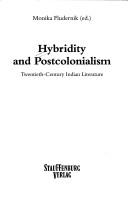
ISBN: 3860577301 Year: 1998 Publisher: Tübingen : Stauffenburg,
Abstract | Keywords | Export | Availability | Bookmark
 Loading...
Loading...Choose an application
- Reference Manager
- EndNote
- RefWorks (Direct export to RefWorks)
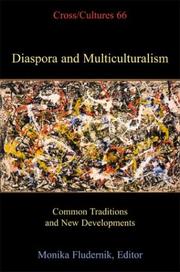
ISBN: 9789004486539 9789042009165 Year: 2003 Publisher: Leiden;Boston BRILL
Abstract | Keywords | Export | Availability | Bookmark
 Loading...
Loading...Choose an application
- Reference Manager
- EndNote
- RefWorks (Direct export to RefWorks)
In postcolonial theory we have now reached a new stage in the succession of key concepts. After the celebrations of hybridity in the work of Homi Bhabha and Gayatri Spivak, it is now the concept of diaspora that has sparked animated debates among postcolonial critics. This collection intervenes in the current discussion about the 'new' diaspora by placing the rise of diaspora within the politics of multiculturalism and its supercession by a politics of difference and cultural-rights theory. The essays present recent developments in Jewish negotiations of diasporic tradition and experience, discussing the reinterpretation of concepts of the 'old' diaspora in late twentieth- century British and American Jewish literature. The second part of the volume comprises theoretical and critical essays on the South Asian diaspora and on multicultural settings between Australia, Africa, the Caribbean and North America. The South Asian and Caribbean diasporas are compared to the Jewish prototype and contrasted with the Turkish diaspora in Germany. All essays deal with literary reflections on, and thematizations of, the diasporic predicament.
Book
Year: 2003 Publisher: Amsterdam : Rodopi,
Abstract | Keywords | Export | Availability | Bookmark
 Loading...
Loading...Choose an application
- Reference Manager
- EndNote
- RefWorks (Direct export to RefWorks)
| Listing 1 - 10 of 38 | << page >> |
Sort by
|

 Search
Search Feedback
Feedback About UniCat
About UniCat  Help
Help News
News